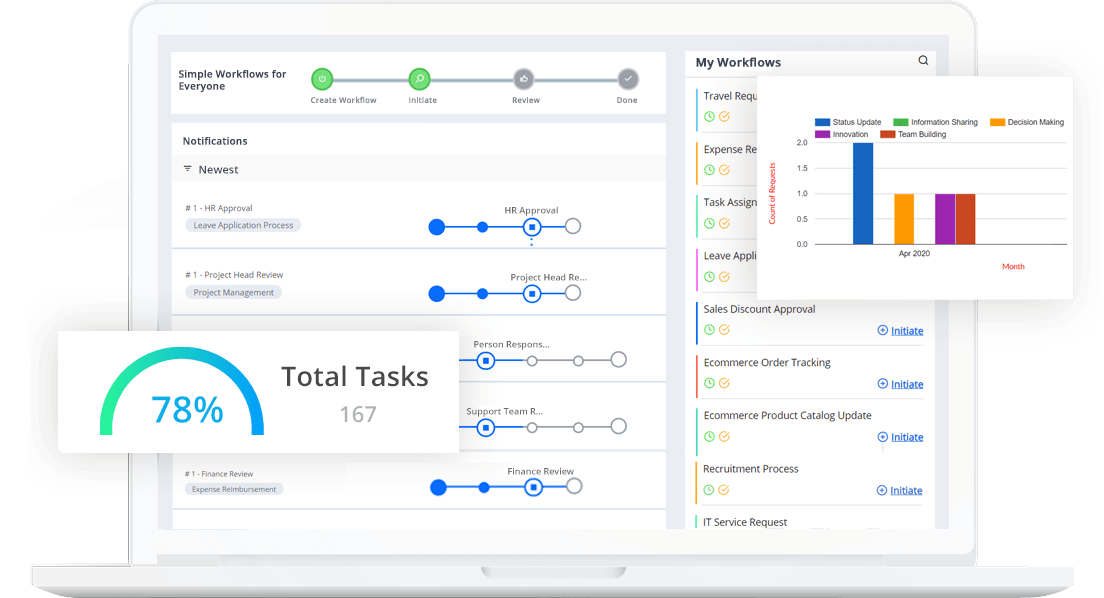Performance Appraisal System – Explore its Types, Methods, and Benefits

There is always this question of how well your organization performs and it ultimately points to the evaluation of the employees’ performance. Evaluation of employees’ performance is not a new concept at all, but the process of evaluation has evolved a long way now.
Advanced performance appraisal systems have changed the game of bringing out the best in the employees, which further improves the working of the organization. A proper system for promotions, rewards, and continued training is created. However, most of the time most companies fail to take full advantage of the process.
Here is a breakdown of what a performance appraisal system is and how effectively organizations can implement it.
What is a Performance Appraisal?
A performance appraisal system is a strategic and systematic evaluation conducted periodically to assess an employee’s work performance against the before-set requirements of the job.
In this evaluation, the employee’s strengths and weaknesses are studied to determine their relative worth and finally to unfold their potential to contribute to the organization’s future potential. Certain other terms like job performance evaluations, performance reviews, development discussions, and employee appraisals.
What is a job performance?
Job performance is the measure of work that an employee fulfills based on their job description. The tasks include achieving the set objectives and also meeting the criteria of the job role. Employee behavior is also an important element that contributes to an organization’s growth. Instances like helping colleagues and also making valid contributions apart from the designated duties. This can generally be termed as extra-role performance, contextual performance, or organizational citizenship behaviors.
Performance appraisal is essential for every organization as it gives the business a comprehensive idea of how businesses can be improved or taken to the next level.
Definition of a Performance Appraisal System
The performance appraisal system refers to the set of methods and tasks that an employer practices to evaluate the performance of their employees. The appraisal system will analyze the performance trends of each employee. With such a system in place, standardization is achieved with a framework being set for the evaluation.
The new approach to the appraisal system is more comprehensive than the traditional ones. Conventionally, performance appraisal systems were used only once a year, where conversations regarding only the past few months’ performance were discussed with the employees.
The focus mostly relied on the feedback system, which was again irregularly conducted. Not much importance was given to such an appraisal system. With several pitfalls accompanying the traditional system, businesses were clearly lacking in many aspects.
With the pandemic, many new standards within performance management have evolved with remote working. One-to-one check-ins and updates regarding progress were made more frequent. It uncovered that around 30% of business organizations have made basic changes to the formal performance appraisal systems to meet and overcome the challenges posed by the pandemic. Progress can be made only through smaller steps.
Hence, in this new system of appraisal, there is more scope for deep, insightful, and useful conversations with employees. This to a great extent, reduces the stress of conducting this process.
Difference between Performance Management and Performance Appraisals
Performance management is the overall dynamics between the employees and the employer that aids in the improvement of performance. These may include all the interactions that happen within the organization.
On the other hand, a performance appraisal is a subset of performance management. It is one of the ways in which the performance of the employees can be judged and improved. Performance appraisal may include formal and informal meetings that can be either planned or unplanned:
| Informal | Formal | |
|---|---|---|
| Planned | 1-on-1 | Performance appraisal |
| Unplanned | Hallway check-in | Ad-hoc sit down |
Types of Performance Appraisal Systems
Performance appraisal is not a process that has a fixed outline of conduction. Hence, the performance appraisal system has several types for achieving seamless performance assessment and improvement. An organization can choose the right type of appraisal system according to its workforce size and other aspects. Here are some of the main types of performance appraisal systems:
1. General Appraisal
The General Appraisal system takes care of the basic parameters of a traditional performance management system. This appraisal is conducted annually to evaluate the performance of the employees and hence, this meeting happens between the management and team members. The ultimate aim of general appraisal is to discuss individual performance and monitor their overall contribution toward the business’s success during the review period.
2. 360-Degree Appraisal
The 360-degree appraisal is a feedback-based appraisal system. It focuses on collecting feedback and other information regarding the performance of the employees from different stakeholders within the organization. This is generally achieved by sending a questionnaire to other supervisors, co-workers, and team members, and also self-assessment.
3. Manager Performance Appraisal
These types of appraisal systems are conducted to set specific goals and objectives that are oriented and attributed to the employee’s job role as well as the organization’s overall success strategy. During this appraisal process, the main steps are setting further goals and their upcoming progress, their acquired achievements against the set goals, and the performance score or rating that will be given by the respective manager,
4. Negotiated Appraisal
In a negotiated appraisal system a mediator is used to help evaluate the performances of the employees. Here, the emphasis is given to the best parts of the employees’ performance. This type of performance appraisal system is best suitable to situations where there are disagreements or problems between the manager and the employee.
5. Peer Assessment
In a peer assessment appraisal system, the other team members, workgroup, and the other department co-workers are asked to determine and grade the performance of a particular employee through rating.
6. Self-Assessment
As the name suggests, a self-assessment appraisal system is where the employee assesses and rates themselves against different criteria like job performance, behavior, attitude, etc.
7. Psychological Appraisal
A psychological appraisal system is used when the business is keen on the well-being of its employees. Deep focus is given to the employee’s potential in giving for the future rather than focusing on their past performance.
Why is Performance Appraisal Important?
Every organization’s goal is to achieve the set goals and gain profit. A performance appraisal is an excellent source of gaining an in-depth understanding of the standards of work. The impact that performance appraisals offer in improving the overall performance of the organization proves its importance.
Here are some important and impactful benefits to acquire from performance appraisal systems.
- It facilitates employee growth and advancements
- It strengthens employee engagement and retention
- It helps reduce skills gaps and catalyzes organizational performance
- It effectively improves communication between internal and external factors
- It brings in proper responsibility and accountability for all the roles.
- It helps in making fair and transparent decisions
- It aids the companies in building promotion plans for well-performing employees and relieving inefficient ones
- The companies can get an idea of how to compensate employees and also define extra benefits and allowances.
- The recruitment process can be upgraded as performance appraisal lets the managers focus on the desired skills and qualifications for different job roles.
- As the employees’ strengths and weaknesses are discussed in-depth, they can grow professionally.
- It helps organizations point out performance trends easily.
- It simplifies the process of collecting and maintaining documents on employee performance.
- Organizations can easily determine the tools that are essential for achieving future performance goals.
What are Performance Appraisals Used For?
The performance appraisal system is a crucial factor for any organization as it serves dual purposes to the organization as well as the employees.
For Organizations
Employees are an important asset to any business organization. Hence, effective employee assessments are essential as they provide deep insights into the efficiency of their performance. They can measure the value and productivity, and also the influence their employees offer. These assessments can be used to develop the performance in the areas of lacking for every employee as well as help companies to provide them with good working conditions, training, and developmental opportunities. All this can be achieved using an effective appraisal system.
Benefits to the Company:
- Working conditions can be enhanced based on the insights and results obtained from the appraisal process.
- Identify and detect behavioral issues in employees before they affect the efficiency of an organization.
- The company can aid and assist their employees in enhancing their skills and careers.
- Increase scope for strategic decision-making during situations like layoffs, filling of job positions, or succession planning.
- Proper motivation can be given to employees by recognizing their talents and skills.
For Employees
In the case of the employees, a performance appraisal system provides them with the opportunity to locate the areas for improvement in their role. Moreover, it creates a space for recognizing the achievements of the employees and the chances for offering promotions or bonuses increase. In case the employee is found to be lacking in certain areas, proper training can be arranged for further improvement. On the surface level, an employee can self-assess and gain an idea about their performance and what they have to do to enhance their performance.
Benefits for the Employee:
- An employee’s efforts are acknowledged and appreciated based on their contributions and achievements.
- Accurately measure their performance and have awareness of the upcoming promotions and bonuses.
- Recognize and demand extra training and education to upskill in their profession.
- Identify the area of drawbacks for improvement
- The performance appraisal system encourages employees to fall back on track and be active in professional development.
How do Performance Appraisals Work?
Performance appraisal systems are generated and built by the Human resources (HR) department. This is used as a tool to gauge the performance of the workforce of a company and take necessary actions accordingly. This system allows one to spot success points as well as the limitations in the functioning of the different organizational processes. Performance appraisals create opportunities for employees to move ahead in their careers. These offer them effective feedback on their efficiency in work and assist them in achieving the set future goals.
There are several methods to adopt in carrying out the appraisal process. The Human Resources professional or the managers are responsible for choosing the right method of performance appraisal. Let us look at some of these methods for performance appraisal.
Methods of Practicing Performance Appraisals
720-Degree Feedback
More than a 360-degree appraisal that collects feedback within the organization, a 720-degree appraisal method garners feedback from the internal as well as the external factors of the organization.
The Assessment Center Method
In this method of performance appraisal, the employees are tested based on certain exercises that are conducted by the designated assessment department. These exercises may include computer simulations, discussions, role-play, etc. Parameters like administrative abilities, communication skills, emotional stability, mental preparedness, confidence and assertiveness, etc are measured and graded during the several exercises.
Behaviorally Anchored Rating Scale (BARS)
With an already established behavioral framework, the employee’s performance is studied for a specific time. Each criterion in the framework has a defined rating that helps in grading.
Checklist Method
The checklist method is practiced by using a questionnaire that contains a set of questions that have yes/no answers asked for several traits.
Critical Incident Method
Any good or bad incidents in the organization can be classified as critical incidents. The employer takes the critical behavior of the employee into account.
Customer/Client Reviews
The customer/client review method is best suitable for the business-to-customer (B2C) sector. The company can ask for reviews from the customers or the clients as feedback. From this, the performance of the employees and the business in general can be studied.
Field Review Method
This method of evaluation is carried out by the HR department or any corporate representative.
Forced Choice Method
The forced choice method is again a questionnaire that carries a set of true or false questions.
General Performance Appraisal
This is the common method of performance appraisal where the manager and employee have regularly scheduled meetings to discuss their performance and future goals.
Human Resources Accounting Method
Also known as the “cost accounting method” or “accounting method”, this method mainly focuses on the monetary value an employee offers to the company. It also includes a company’s expenditure in retaining that employee.
Management By Objective (MBO)
Discussion and setting of goals for the employee to work on this major agenda in this method. Once the goals are set, the manager and the respective employee monitor the progress that has been made to reach the set goals. The process ends with the manager judging whether the goals have been achieved.
Performance Tests and Observations
This method is oral-based. The employee’s skills and knowledge in their respective fields are measured and tested. The manager can pose a challenge to the employee and ask them to demonstrate skills in solving the problem.
Project Evaluation Review
The project evaluation review method typically happens at the end of every project and not at the end of every year.
Rating Scales
Factors like dependability, initiative, attitude, etc., can all be rated from excellent to poor or any similar rating scale. The overall performance of the employees can be calculated using this rating.
Peer Review
In a peer review system, the co-workers of the employee are asked to give feedback on their performance. The team members are majorly preferred as they tend to know the employee’s strengths and weaknesses.
Ideal way to structure a Performance Appraisal Process
As discussed earlier, the performance appraisal system in an organization can have a combination of different types and methods of appraisal systems. The best, standard, and ideal structure a performance appraisal system can have is as follows:
- Employee self-service
- 360-degree appraisal
- Manager performance appraisal
- Rewards and recognition program
- Performance improvement plan
How to Create an Effective Performance Appraisal Process?
Having a framework and fixed evaluation criteria is a must. A well-defined job performance evaluation form that collects all necessary data forms the base for the appraisal process. A sample job performance evaluation can have the following elements.
| Top of the page | Name of the employee
Employee ID Appraisal date Name of the Manager |
|---|---|
| Performance section | Details like rating of the employee based on the task delivered with the job description as the evaluation parameter. |
| Behavior section | Details on the overall behavior of the employee can be ranked here. This is the section where managers can identify if the employee is putting in extra effort. |
| Improvement section | Details on how the employee needs to improve in the lacking areas. |
Some points to consider are:
- Define the core competencies and job-specific competencies for the success of the role role.
- Measuring the in-role and extra-role behavior of the employees is crucial. This is an all-encompassing measuring approach that can give companies a comprehensive idea about their employees.
Tips and Techniques for Performance Appraisals
There are some essential tips and techniques to adopt in order to excel in the process of performance appraisal.
Document all the Appraisal Sessions
Storing all the notes and appraisal meetings in an easily storable database. By doing so, the managers can have easy access to it and can aid in making impactful decisions for the follow-up meetings.
Use Framework
Online templates can be used for performance appraisals. Having a fixed framework can let you have a standardized process for conducting the appraisal. This brings consistency across departments and all employees can be evaluated using the same set of parameters within the team.
More Frequent Check-ins with Your Employees
Frequent communication with your employees is essential for their efficient working. Issues caused by errors can be negated with consistent regulation and check-ins with the employees to ensure they are not on the right track and progressing.
Some additional tips:
- Involve your employees as much as possible
- Motivate managers to acquire a better communication style while in conversation with the employees
- For excelling employee performance, ensure an efficient feedback system
Essential Features in a Performance Appraisal System
Some essential features to look for in a performance appraisal system are as follows.
- The tool must be able to carry out all the basic appraisal processes like setting up and tracking goals, rate the job performances, and get deep insights into the performances.
- A cloud-based system would allow managers to conduct performance appraisals on the go.
- Customization is an essential aspect. The users must be able to effectively streamline the performance management process through customizable templates, enable multi-level appraisals, and automated approvals and reminders.
- Integration with HR tools and software is a must. A comprehensive approach is needed in conducting the appraisal process. A tool that supports integration with third-party applications can help managers to optimize the process.
- 360-degree feedback is important. A tool that can onboard the employees across departments to give feedback.
Cflow – The Most Trusted Performance Appraisal Systems
Cflow is a no-code workflow automation platform that focuses on summoning productivity to organizations. As a cloud-based platform, Cflow can seamlessly streamline all the key processes in performance management and effectively carry out performance appraisal. Cflow offers a space where managers and Human Resources professionals can easily connect with the employees as well as do the required documentation with the platform itself.
Some of the essentials that Cflow offers are:
- Customizable workflows for effective streamlining of the process
- Allows integration with 1000+ external applications
- A cloud-based storage system using which the appraisal processes can all be documented easily.
- Offers automated notifications and reminder system
Conclusion
The Performance Appraisal system is an essential part of an inevitable process. The business organization and its employees are in a symbiotic relationship. The productivity of the business depends on the productivity of the workforce. Hence, regular monitoring of the performance of both must be set in place.
A performance appraisal system is a process that can monitor and evaluate the performances of the employees that in turn will drive the business to prosperity. An organization’s appraisal system is unique to itself. Cflow lets you create your own. Our platform has the potential to offer the organization its desired productivity through a well-orchestrated performance appraisal system.
Sign up now and experience it!






